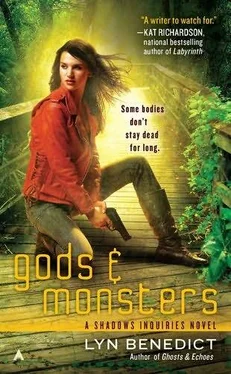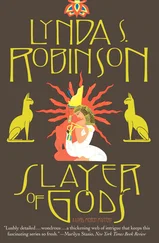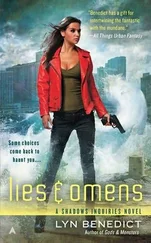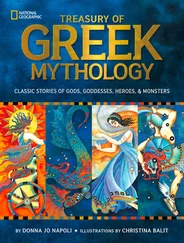Too close to the woman who went up in flames?
Or something worse.
Wales hissed when he joined her.
“What do you think?” Sylvie asked. “Collateral damage or intrinsic?”
Wales tilted his head, listened to Marco, his body slowly tightening. “Marco says she’s close to death. The spell—it’s too much energy to contain. Even like this.”
“What’s the spell for?” Sylvie said. “It’s an awful lot of work to go to if we just have a sicko sorcerer who likes his girls passive.”
“I don’t know,” Wales said. “It’s not . . . It seems nonsensical. If I can figure out what the symbols represent, I might be able to get a better idea. But I can’t do that here. All I can tell you is that the magic feels strange. Like it’s trying to do two things at once. The power’s both coming and going. Like . . .” He crouched, put his hands into the water, licked swamp off his fingers while Sylvie felt her nose wrinkle in disgust. Necromancers. Always with the organics.
“It feels like some kinda exchanger,” he said. “Like a person breathing. Changing oxygen to carbon dioxide. Some type of magical chemistry. It’s—” He jerked upright, wiped his hands on his pants, and said, “It’s too complicated not to be fragile. I think we should get ourselves gone before Marco or I have an adverse effect on the holding pattern.”
Sylvie studied the women; she hated like hell to leave them behind. But she’d known that was a possibility the moment she began snapping pics: That wasn’t the kind of thing you did if you expected to solve the problem then and there. Their options were so limited. They hadn’t come prepared to camp out, hoping that the spellcaster would return. They could try to disrupt the spell. . . .
Wales was obviously following along with her thoughts; he shook his head. “We’ve got no guarantee they wouldn’t just burn if we broke the stasis.”
“Can you break the spell completely?”
Wales grimaced. “Not without making a few mistakes first. Which would kill most of them.”
Sylvie tapped her gun barrel, thinking. “If we leave, and you figure out what the symbols mean, what all the spell’s actually trying to do—”
“I might be willing to give it a try,” Wales said. “Even if I can’t break off the spell, I’m a necromancer. I can encourage it toward entropy. Encourage it to break itself.”
Sylvie blinked. “You can kill a spell.”
“Theoretically?”
She sucked in a humid breath, tasting her own frustration. “How long’s Maria got, you think?”
Wales had another one of those whispered conferences with Marco. Sylvie turned away, staring out over the still water that held the women like flies in amber. A drawback to working with necromancers. Hanging out with the person who looked like he had an imaginary friend. Negative points on the discretion factor.
“Best guess? Four days, maybe.” Wales ran a damp hand through his too-long hair; he left dark streaks behind on his cheek. “It’s like . . . stress, right? Too much stress, and the body rebels. For all intents and purposes, Maria’s having the world’s slowest heart attack. The spell can’t hold it off forever.”
The women bobbed gently in the water, imprisoned without a cage. Sylvie thought of Maria’s high-strung husband, so lost without his wife, of what Lio would say, and her stomach soured.
Her voice was clipped when she said, “Fine. We’re out of here.”
She took a last, frustrated look at the innocent women she was leaving and stalked off back toward her distant truck. It felt . . . wrong. Like she was walking away from a fight.
Sylvie never ran from a fight. It wasn’t in her blood.
RUSH-HOUR TRAFFIC SLOWED THEIR DRIVE HOME TO A CRAWL AND helped Sylvie give herself a tension headache from grinding her teeth so hard. But the first time she’d let loose with a volley of profanity and the horn, Wales had gaped, and asked, “Kiss your mother with that mouth? Christ, Shadows. I know sailors who’d balk before saying half of what just came out of—”
“Shut up,” Sylvie said. “I wouldn’t be so pissed if you’d—” She cut herself off; he had done his job. It wasn’t his fault that he didn’t have the instant solution she wanted.
His jaw was tight when she glanced over, locking back his own need to argue. She’d decided he was right. Silence was golden. Otherwise, she’d be a road-rage statistic.
By the time they made it back to the South Beach office, Sylvie wasn’t a lot happier, but she was calmer.
That lasted until she stepped inside, squinting at the transition from tropical sunlight and soaring sky to fluorescent bulbs and low, dark-painted ceiling. When her eyes adjusted, she found that Alex wasn’t alone.
Alex sat on the reception desk, swinging her feet, and across from her, sitting on the couch, Caridad Valdes-Pedraza was striped in the sunlight that seeped through the miniblinds.
“Get out,” Sylvie said.
Alex said, “Sylvie! Be polite! This is—”
“We met last night,” Sylvie said. “She’s a reporter, Alex.”
Wales growled, pushed past her, and raided her fridge, pulling out an icy bottle of soda. He pressed it to his face, his long neck, the open vee of his worn T-shirt. Alex watched him, belatedly responding to Sylvie.
“Duh.” Alex raised a binder, flipped it open to show a sheaf of paper about twenty pages thick. “She’s doing a story on missing women.”
“Her research is for crap,” Sylvie said.
“Looks good to me,” Alex said.
Caridad had the grace to rise and look shamefaced. “I know I’m intruding,” she said. “But it’s important. You know it is, or you wouldn’t have spent the day in the Everglades.”
“Alex,” Sylvie hissed.
Alex shrugged. “I didn’t tell her. But you’re both sunburned, muddy, and stinky. Hardly a stretch.”
“I know we got off on the wrong foot,” Caridad said. “But give me another chance.”
“Why should I?” Sylvie said. “If you really wanted to help these women, you’d be haunting the police station, not me. You just want the damn story.”
“It’s not like the police will listen to her. Not when she’s talking about monsters,” Alex said. “Besides, think about it this way. You and Cachita find the women, it’s a win-win. You save them, Cachita writes about it—we might get more business.”
“Whose side are you on, Alex?” Sylvie said. Alex shrugged a narrow shoulder.
Wales slumped onto the couch. “Do you really need more business? Ever since I met you, it’s been go, go, go.”
“Sylvie gets bored,” Alex said. “You wouldn’t like her when she’s bored. She does shit like—”
Sylvie coughed, cocked her head in Caridad’s direction, and Alex shut up.
“Cachita,” Alex said. “Maybe you’d better go.” She took in Wales’s scarlet nose and cheeks and dug out the first-aid kit with a resigned huff. “I think we’ve got some aloe gel in here.”
“All right,” Cachita said.
Sylvie thought her jaw might drop. Caridad hadn’t been anywhere that docile the night before. But before her surprise could turn to pleasure, the woman paused, running her nails thoughtfully along the seam of her jeans. “Sylvie, you saw the news report about the monster, right?”
Sylvie closed her eyes. She’d known it wouldn’t be that easy. “What monster?”
Caridad dropped back into the seat she’d just vacated, brought her briefcase up, and popped it open. She dug out her netbook, flipped it open.
“Caridad, I don’t want a PowerPoint presentation,” Sylvie said.
“Cachita, please,” Caridad said. “Here.” She cued up a video. The local news. Morning edition. When people were credulous and not looking for more than sound bites to flavor their coffee.
Читать дальше












